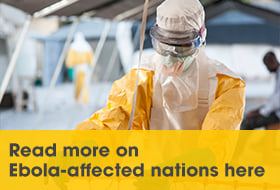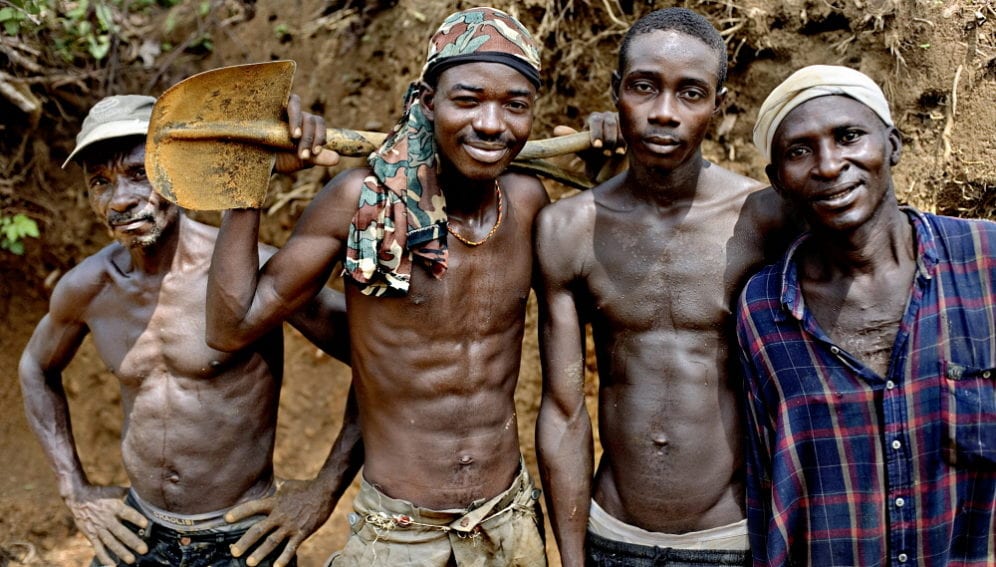By: Noshua Watson
Send to a friend
The details you provide on this page will not be used to send unsolicited email, and will not be sold to a 3rd party. See privacy policy.
A fund worth US$10.5 million is assessing proposals for emergency research on humanitarian operations and interventions for the ongoing outbreak of Ebola. Scientists will begin receiving funds from the Research for Health in Humanitarian Crises initiative in October, just two months after it was announced. The goal is to find evidence-based ways of responding to the current Ebola outbreak and draw lessons for future outbreaks.
I would encourage researchers applying for the grants to consider collaborating with firms there, especially mining companies.* They are often the most capable institutional presence in geographically isolated areas. And they have greater financial and organisational resources for dealing with the crisis than much local and national public health agencies.

Mining companies generate a considerable portion of GDP (Gross Domestic Product) in West African countries, particularly in Sierra Leone, where most of the confirmed Ebola cases have occurred. They also already devote substantial resources to health initiatives around AIDS, malaria and tuberculosis in Sub-Saharan Africa more widely, as shown in a recent study that I drafted. [1]
The study, which was funded by HANSHEP, a collection of development agencies and governments working to augment non-state contributions to delivering healthcare to the poor, summarised its findings in a good practice guide for companies’ health programmes. [2] It says the best company initiatives go beyond simple measures to increase workers’ productivity to partner with local stakeholders; include nutrition, sanitation, education and livelihoods in their design; support community and national health frameworks; and are systematic and evidence-based.
Because of such programmes, many mining companies have expertise in community outreach, in providing treatment and in recruiting medical professionals — all of which are critical capacities for stemming the outbreak.
Some companies initially responded to the Ebola crisis merely by making donations to UN agencies, including the WHO and UNICEF (the UN Children’s Fund), and by intensifying their community health education programmes. Others may have actually done more harm than good. For example, in April, Brazilian mining company Vale, which operates in Guinea, evacuated international staff and put local workers on unpaid leave. [3] Although this was a reasonable initial response, the World Food Programme found that the resulting fall in household income has left some people more vulnerable to food shortages. [4]
Yet a number of mining companies have shown what can be achieved with well-considered actions that take account of the complexity of the Ebola crisis. Eleven mining and commodities companies have collectively chosen to continue operations in West Africa, but with additional health and safety precautions, For example, they use infrared heat monitors at work site entrances to detect workers who have a fever, and provide additional sanitation equipment in local communities. [5] This kind of response is sensible and shows what the private sector can potentially offer in the fight to control the virus.
Most calls for the private sector to help with the outbreak have so far focused mainly on pharmaceutical companies’ research and drug development capabilities. But the organisational and healthcare expertise of the private sector has been largely ignored. The WHO and UN system should incorporate the mining industry’s presence and existing engagement with public health systems into its response to the outbreak.
Noshua Watson is a business and technology researcher who specialises in the role of the private sector in international development. She has worked in media, academia and the private sector, including for Fortune magazine, the Institute for Development Studies (UK), and technology consultancy firm Accenture.#
*This article was corrected on 26 September. It originally stated that the Research for Health in Humanitarian Crises grants excluded private companies. In fact, the original funding call only stated that firms could not receive direct funding, and did not specify that they would be excluded from collaborating in projects. SciDev.Net also understands that since this piece was drafted the funders have reconsidered this restriction and now allow firms to apply for direct funding.
References
[1] Mining Health Initiative An analysis of what is known about mining industry health programmes (Mining Health Initiative, December 2012)
[2] Mining Health Initiative Good practice guidelines: partnering for effective mining health programming (February 2013)
[3] Saliou Samb and Stephanie Nebehay Miners in lock-down in Guinea as Ebola death toll hits 84 (Reuters, 2 April 2014)
[4] World Food Programme Guinea: Assistance to Food insecure Ebola Victims, Households and Communities in Forest Guinea
[5] Randgold Resources’ Statement on Ebola (8 September 2014)














